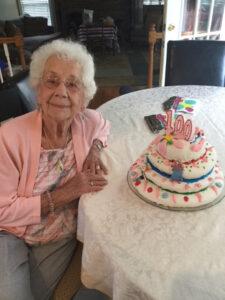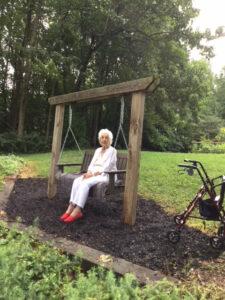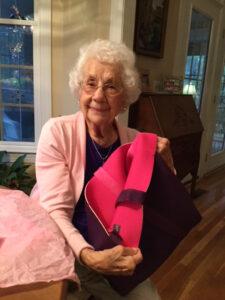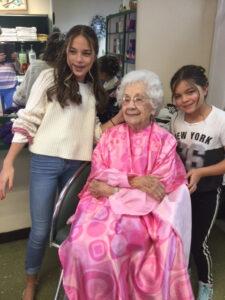Reflections on Women: One woman’s perspective over 102 years
 Interview with Byrl Lamoreaux, nee Salisbury born 12/22/1918, and Grandmother to Theresa Caragol.
Interview with Byrl Lamoreaux, nee Salisbury born 12/22/1918, and Grandmother to Theresa Caragol.
Married 5/21/39…. Celebrated 70 years in May 2009; husband deceased September 2009.
Resided in the states of Michigan, California, and North Carolina over her life time.
Interview with my grandmother 3-30-2022
Question: What big world event impacted you and how did it affect your life?
It was first, the depression with its effect on spending and money, loss of jobs. I was growing up and a young girl during this time period. It was World War 2 that greatly impacted our family, lives and ultimately women going to work. The War was at the time of my “end of growing up” years while living in Grand Rapids (GR) MI. I met Jack/dad at 17, started dating at 18, married at 21 and I was 22 when having my first child. Fathers were taken last during the War. Ultimately, Jack was sent to Japan during the occupation of it and worked at the post office (drafted in 1945 and discharged in 1946). We were parents at ages 22 and 23. It was required that one serve in the War or perform War related work.
Jack had a brother, Les, living and working near Ypsilanti Michigan at the Willow Run Plant (a former automobile factory) and converted to building bomber planes. We moved to the area of Ann Arbor and everyone worked at the Plant. Carpools were common, everyone participated and shared their gas rationing cards. There was a spirit of sharing, and people helped each other out, we (like so many others) planted Victory Gardens to grow our own food; the surplus was taken to a Company who rented out freezer storage space. There were shortages of not only gas, but food such as milk and meat, which were also rationed. We drove back home to GR only twice, due to shortages; we carpooled again with others, and shared rationing cards. Nearly every Sunday, we gathered at a park and shared lunch with the other workers/couples-these were special times and we enjoyed the socialization/fun, and support of others.
My child was 18 months when we moved to Ann Arbor in 1942. After the first year, we were in debt and I needed to go to work. I had only worked in my first job at a dime store, and here I was hired to work in this big warehouse-the bomber/plane plant. Men and Women were needed, and each had a very specific job. Jack worked on Station 8 and I was on Station 12. I was not strong or a large woman and hence not a Rosie the Riveter. Instead, I was a Rigator, which required strong thinking/intellectual skills and was one of the “better jobs”.
The planes moved along to the next station after Inspection. There were lots of Government Supervisors/Inspectors about. If you were done with your part, dad and I could talk to each other. I do remember if we women got done with our jobs, we would sit in the plane or on the Wing, and have “girl talk” time and sometimes men joined us too, if they were done. I remember seeing a man with a big bulging cheek, and it was chewing tobacco I learned, but he was a bit unusual looking with that cheek. 😊
I could not have worked if we did not have good child care. Dad had met a gentleman in the carpool, and liked him very much. We met the couple and the wife, Beth. They had two children and she was home with them. I remember crying and my son too every day when I had to leave him. I did know I could trust Beth. We were very fortunate to have her and I could then go to work and do my job.
*** The issue/need for quality, reliable and safe child care continues for mothers to be the key to being able to work and contribute to your company/employer. Is it still the primary responsibility of the mother?
The Willow Run Bomber Plant closed, and my husband was drafted in 1945. The plan was for me to return to South Haven and live with my parents while Jack was overseas. I remember, I spoiled my son and now wonder if my father who was very strict when I was growing up was disappointed in me. During that time, once a month due to gas rationing, I traveled with my son to GR to see my husband’s family. It was a comfort to be with them as they cared so much too about him. I wrote to my husband every day while he was away.
After the first month back in South Haven, my mother encouraged me to apply for a job as a nurse’s aide at the local hospital. I was hired and trained. My son was in school and my mother also helped with his care when needed. The hospital was an all-female environment other than the Physicians. The war was still going on. I met with the Head Nurse (Catherine, who later became my sister-in-law), who indicated the hospital needed orderlies/males. I encouraged my brother, Ira, just discharged from the service and a former medic to apply, and he was hired. I worked there for 1.5 years. It was my Supervisor, Lorraine, who took me under her wing. I was always impressed with Lorraine as she was so dedicated; she did not sit around or “just talk” but was always cleaning rooms/supplies, etc. She was a very positive role model to me; I had great respect for her and wanted to be like her. She had a very strong work ethic and high values: one should not be careless, have pride in ones’ work, and always do ones’ best. As an aide, I admired the Nurse’s white uniforms and caps. I remember being told to “sit and watch a patient”, I was not told what I was to watch for, and was curious to learn more and know more. I believe, this time was ultimately an inspiration to a goal in my heart and head to become a nurse someday.
 Fast forward to 1962 and a friend approached me about going to a one-year training to become a Licensed Practical Nurse. I agreed, though she withdrew as she could not stand the sight of blood. I enrolled in the program and graduated at age 42 and was second in the class. I worked at a local hospital for 15 years and was always proud of myself and enjoyed having a career. (I remember when asking my dad after high school graduation, if I could go onto college. He said the family could not afford it and the boys would need to be educated first. Though I could understand his beliefs at that time in history, I was disappointed).
Fast forward to 1962 and a friend approached me about going to a one-year training to become a Licensed Practical Nurse. I agreed, though she withdrew as she could not stand the sight of blood. I enrolled in the program and graduated at age 42 and was second in the class. I worked at a local hospital for 15 years and was always proud of myself and enjoyed having a career. (I remember when asking my dad after high school graduation, if I could go onto college. He said the family could not afford it and the boys would need to be educated first. Though I could understand his beliefs at that time in history, I was disappointed).
***Education is really important for women. Role models and mentors are essential – and we need both. Having good and understanding bosses is critical. Self care and wellness have remained really important over a lot of years.
Second interview (4-6-22) with my grandmother sharing reflections on the question:
How has the role of women changed over your lifetime?
The following historical information is included for a perspective on the lifetime major influence on Byrl’s life as noted above: the Great Depression.
Background Reference: Encyclopedia.com
WOMEN, IMPACT OF THE GREAT DEPRESSION: The Great Depression affected women and men in quite different ways. The economy of the period relied heavily on so-called “sex-typed” work, or work that employers typically assigned to one sex or the other. And the work most directly associated with males, especially manufacturing in heavy industries like steel production, faced the deepest levels of lay-offs during the Great Depression. Women primarily worked in service industries, and these jobs tended to continue during the 1930s. Clerical workers, teachers, nurses, telephone operators, and domestics largely found work. In many instances, employers lowered pay scales for women workers, or even, in the case of teachers, failed to pay their workers on time. But women’s wages remained a necessary component in family survival. In many Great Depression families, women were the only breadwinners.
An important corrective to a male-centered vision of the Great Depression is to note that while men’s employment rates declined during the period, women’s employment rates actually rose. In 1930, approximately 10.5 million women worked outside the home. By 1940, approximately 13 million women worked for wages outside the home. Even so, women’s work continued to be less than well regarded by American society. Critics, over-looking the sex-typing of most work opportunities for women, lambasted laboring women for robbing men of much-needed jobs. Even women’s colleges formally charged women not to pursue careers after graduation so that their places could be filled by men.
Federal law stood consistently with this conservative position regarding women workers. Laws in effect between 1932 and 1937 made it illegal for more than one person per family to find employment within the federal civil service. Despite the protestations of Eleanor Roosevelt, the New Deal program the Civilian Conservation Corps, developed in 1933, had a formal policy against hiring women. Many New Deal job programs cast women in traditional housekeeping roles. Camps operated by the Federal Emergency Relief Administration (FERA) specifically for young women taught household skills. FERA work relief projects employed women in producing such goods as canned foods, clothes, and mattresses for distribution to needy families. Women were employed as housekeeping aides to families in need of household help. The housekeeping aides project kept to traditional racial stereotypes as well as gendered ones, as most of its employees were African-American women. Other federal agencies paid women much less than men or gave preferences to male job seekers over female ones.
Women of minority groups faced particular difficulties. Employers preferred white men, and then white women, over black or Hispanic women in most instances. Relegated to domestic work and farm work through centuries of racism and misogyny in the job market, most African-American women found themselves left out of new laws passed to ensure worker safety. The Fair Labor Standards Act of 1938, with its minimum wage and maximum hour provisions, did not apply to domestic or farm workers. Given the pressures of the economy, many women—white and black—were willing to work in domestic positions, but fewer households had the extra income to hire help. Many cities developed specific locations where prospective domestic workers would stand outside and wait for wealthier women to hire them for a day’s work. Given that those seeking employment were most often black and given the low wages one would earn in such arrangements, the process and the area of town associated with it became known colloquially as a “slave market.” The casual nature of the oral contract between employer and employee in this hiring system meant that many women were inadequately paid for their labors.
Interview:
 While growing up, at age 14 in 1932, I recall my mother going to work. Up until that time, women’s role was to be the home keeper; so, it was at this time, women came out of the “kitchen”. My mother went to work at a candy company and was a “chocolate dipper”. It changed our lives…my older sister took over the household duties and meals; everyone helped in the kitchen, I was responsible for cleaning, and I remember my two brothers taking ashes to the dump in a wagon daily. Women began working as the factories closed during the depression and men were out of work. Some of President Roosevelts programs were motivating for men but limited in scope for women. Women had certain opportunities such as teachers, nursing, other service industries. My first job was as a clerk at a dime store. I was paid 32 cents/hour taking home $13. I gave my mother $3 and had to share some with my sister as she was attending beauty school. I started a savings account, and eventually saved enough to buy a bed, a vanity with a mirror, and chest of drawers.
While growing up, at age 14 in 1932, I recall my mother going to work. Up until that time, women’s role was to be the home keeper; so, it was at this time, women came out of the “kitchen”. My mother went to work at a candy company and was a “chocolate dipper”. It changed our lives…my older sister took over the household duties and meals; everyone helped in the kitchen, I was responsible for cleaning, and I remember my two brothers taking ashes to the dump in a wagon daily. Women began working as the factories closed during the depression and men were out of work. Some of President Roosevelts programs were motivating for men but limited in scope for women. Women had certain opportunities such as teachers, nursing, other service industries. My first job was as a clerk at a dime store. I was paid 32 cents/hour taking home $13. I gave my mother $3 and had to share some with my sister as she was attending beauty school. I started a savings account, and eventually saved enough to buy a bed, a vanity with a mirror, and chest of drawers.
I recall the 1960s as a time for freeing women to some degree with the availability of the birth control pill and IUDs. It seemed there was a national focus on women. Still there were limited fields for work and the majority of American people were moving to the cities and leaving the farms. The social changes greatly impacted women, as I recall.
I always had an interest in artistic endeavors. We were living in California in 1949 (my husband and 2 children). There was a ceramic shop near our home and I went to visit it, and enrolled in a ten-week class at night; my husband watched the children and was very supportive. I loved it and there was a magazine that listed other ceramic shops and I went to look at one to learn more about the craft and process, etc.
We returned to Michigan in 1950, and I continued the pursuit of my new craft. I was able to buy my own kiln. I made multiple items and my landlady and brother-in-law, would sell items for me. Some of the popular items were Santa mugs and Christmas trees, candy dishes in leaf shapes, and horses. It was gratifying to work in my craft and make money for our family. I later started teaching classes upon the encouragement and interest from neighbors and other women. It was a big help to supplement our family income over the years. I also attended classes from other teachers to improve my skills. When I started nursing school, I left the field temporarily, and did enjoy seeing some of my former students become teachers, themselves. I later became interested in china painting, and took classes at night, made items, and placed them in craft fairs. I became a business woman so to speak, and my husband helped me get my items into different stores. He was always supportive to me. I remember being on TV and presenting my craft of ceramics, and my hubby came home from work to watch me on the noon program.
I would love to have been able to go to college. The women who did came from homes with “old money” so to speak. I graduated high school as did my husband. He was the youngest of nine children and the only one to do so in his family. One of the values that my parents imparted since I was young was the expectation to attend high school and graduate. I enjoy learning still, and am so proud of the women’s leadership movement while recognizing it is still evolving.
Themes: Support from other women is essential. Knowledge is power. Tap into the creative side of yourself. Supportive spouses are critical to success always.
Support from other women over the years, inspiration and taking advantage of an opportunity, having support from others. Tapping into a creative aspect of one’s self. Supportive spouse is critical to success as a woman always.
Third Interview with my grandmother on 4-20-22 with responses to the question:
As you look back on your life of 103 years, what might be some life lessons, or important things to remember in general about being a woman as one matures and makes decisions about her career and continues life-long learning/growing?
I think, education would be number one on the list to continue advancing and growing, not just education, but knowledge. Knowledge in both your chosen field, and life knowledge. The more you can know, then you are more prepared for anything that comes your way.
 Also, I would say not to ever give up on your dreams/goals. I always wanted to be a nurse; and I did pursue my dream; just a little later in life.
Also, I would say not to ever give up on your dreams/goals. I always wanted to be a nurse; and I did pursue my dream; just a little later in life.
Another important value, I believe in, is the importance of exercising one’s brain. It is so important to be mentally fit; I still enjoy and read books daily. Another important related aspect is staying up to date (especially in your generation and with technology) i.e., keep up to date on all of the new, evolving changes and advancements in one’s field.
Question: What about other life kind of things that matter, such as, building /sustaining relationships?
When making decisions, initially, you may want to question yourself; but then one needs to not go on and on, and agonize over a decision; as it can immobilize you. Go with what you believe!
I think being very open and honest is important in relationships; do not be secretive or sly. Another word would be to be authentic in all relationships and in conversations. Don’t play games with people.
Try to act and make decisions so that you will not have any regrets later around your choices/decisions… be it in relationships, or choosing a certain behavior or taking a certain action.
